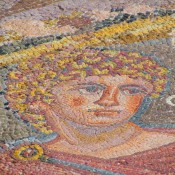During the first week of February 2020 (3-8 February 2020), a workshop for the ‘CONSERVATION AND PHYSICOCHEMICAL STUDY OF METAL ARTEFACTS’ will take place at Athens in Greece. The course will be organized by the Faculty of Archaeology, Leiden University (NL), in collaboration with the Ephorate of Antiquities of Euboea (Chalkis), the Netherlands Institute at Athens (NIA), and the Greek Research Center/Laboratory ‘NCSR Demokritos’ at Athens.
This workshop provides a unique opportunity for BA, MA, RMA and PhD students to gain more knowledge and a hands-on experience in Byzantine metal objects conservation. It guides the participants through the history and technology of Byzantine metal objects in Greece, and through stages of the study, conservation, restoration and documentation of archaeological artefacts. Both the theoretical and practical classes will be based on authentic metal finds from Euboea (GR). Finally, a first approach of physicochemical analyses will be presented. All teaching will be in English.
During the workshop students start their training with original artefacts once they reach to an acceptable level of skill, accuracy and precision. Most participants will be able to master conservation and restoration techniques within this workshop, and will complete work on 2 artefacts by the end of the program, depending on the initial state of the objects’ conservation, the necessity of conservation treatment and the individual performance of the student. The participants should present their results on the last day of the workshop.
The project includes four modules:
1. Lectures on the history and technology of Byzantine metal objects, on preventive and on physicochemical analyses of them.
2. Practical work in the documentation and conservation of authentic metal finds from Euboea (GR), dated to Byzantine period.
3. Study visits to the Archaeological Museum of Athens, the Acropolis Museum and the Greek Research Center / Laboratory ‘NCSR Demokritos’ at Athens.
4. Presentation of the students’ output of the workshop.
By the end of the workshop the participants will:
-get knowledge on the exchange of goods and the use of metal objects;
-learn about shapes, types and technology of Byzantine metal objects & improve their knowledge on Byzantine history and archaeology in Greece;
-get acquainted with the basic methods of documentation for the conservation and restoration of Byzantine metal objects;
-learn about the necessity of physicochemical analyses on metal objects;
-meet professionals who not only work in metal objects conservation and in Byzantine Archaeology in Greece, but who also work in physicochemical analyses of Byzantine, Medieval and Post-Medieval metal objects.
General information
Project type: Workshop ‘Conservation and Physicochemical Study of metal objects’ at Athens-Chalkis, including the basic principles of physicochemical analysis of metal objects & the importance of physicochemical methods in the study and conservation of metal objects.
For: BA, MA, RMA and PhD students in metal objects conservation & in archaeology (both beginners and advanced students).
Duration of workshop: One week in Athens – Chalkis: from Monday morning 3 February (9.00 am) to Saturday morning 8 February 2020 (15.00 pm).
Application deadline: 24 January 2020, or until the places are filled (maximum 15 persons).
Application: application forms can be downloaded from the website of the Netherlands Institute at Athens (NIA): see www.nia.gr. Completed forms (including a motivation letter) should be sent by 24 January 2020 to: [email protected].
Venue: Netherlands Institute at Athens (NIA); the Ephorate of Antiquities of Euboea (Chalkis); Research Center / Laboratory ‘NCSR Demokritos’ at Athens.
Costs: The workshop’s fee of 250 Euro includes tuition, teaching materials, room and board (shared accommodation in double rooms) at the Netherlands Institute at Athens, including 24-hour access to the NIA Library Greek students living in Athens pay 200 Euro. The participants are supposed to pay their tickets to Athens and their meals during the workshop.
Visits: Archaeological Museum of Athens, Acropolis museum.
The major workshop’s activities:
The main goal of this program is to provide students theoretical knowledge on Byzantine metal objects, as well as the conservation of metal objects. In addition, hands-on training experience on preventive conservation will be applied. For a better study of the artefacts, physicochemical analyses are carried out in the ‘Demokritos Research Center / Laboratory’ at Athens, which aims to a better diagnosis of the construction technology, the pathology and the damages of the objects under study.
The workshop is completed with the writing of a ‘condition report, and documented with photographs and drawings. Another essential part of the workshop comprises the conditions of exhibition and storage of archaeological artefacts in museums according to international
standards.
Workshop coordinator:
Prof. Dr. J.A.C. Vroom, Archaeology of Medieval and Early Modern Archaeology in Eurasia, Faculty of Archaeology, Leiden University (NL).
Workshop instructor:
Adamantia Panagopoulou, PhD Candidate at Leiden University,
External researcher at Institute of Nanoscience and Nanotechnology; ‘NCSR Demokritos’ Artefacts used: Byzantine metal objects from Euboea (GR).
Minimum age: 18 years old
Language: English
Experience required: None
Special requirements: Good physical condition and command of manual operations. The average temperatures in the area are about 10-160 C. All participants should bring clothes and cosmetics suitable for cold weather. It is recommended that participants bring their laptops.
All participants are expected to prepare for the workshop by reading at least the notes that will be sent to them (some notes will be sent by e-mail to all registered students before the beginning of the project) and other recommended readings. Participants will use tools and equipment available at the site and are not expected to bring any additional equipment.
All participants will receive:
-Project notes (in a PDF version by e-mail).
-Certificate specifying the fieldwork hours, educational modules, and sites -T-shirt.
-3 ECTS.
Partners in this project:
Faculty of Archaeology, Leiden University; the Ephorate of Antiquities of Euboea (Chalkis); Netherlands Institute at Athens (NIA); Greek Research Center/Laboratory ‘NCSR Demokritos’ (Athens).
Contact for more information: Adamantia Panagopoulou,
[email protected]





